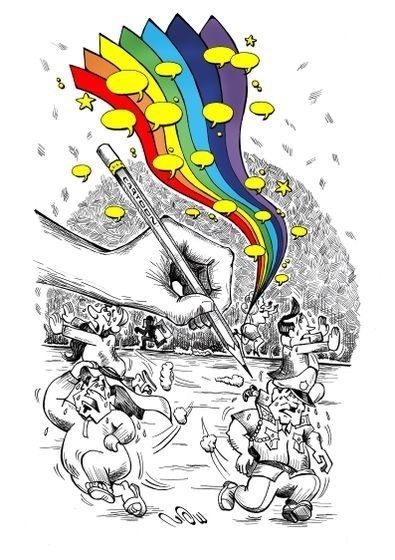To Be Brief and Brilliant: An Interview with Iraqi Cartoonist Saad Murtadha
by Caitlyn Christensen / May 1, 2015 / 1 Comment

Cartoon by Saad Murtadha, image via Cartoon Movement.
While Saad Murtadha’s day job is as a service technician and engineer, his passion is working as a political cartoonist. As it is difficult for cartoonists in Iraq to make a living wage, he publishes his work on a freelance basis. Although he drew cartoons throughout school and college, Mr. Murtadha was afraid to publish his cartoons under Saddam Hussein’s regime; the government strictly controlled Iraqi media. After 2003, he began to publish his work in local newspapers. Today his work is largely available on Cartoon Movement. Without formal training, Mr. Murtadha learned to draw by observing television animation and newspaper cartoons. He names the ideas of Palestinian cartoonist Naji Al Ali and the style of American cartoonist Kevin Kallaugher, who publishes under the penname KAL, among his influences.
What is the freelancing situation in Iraq like? What are the threats associated with being a freelance cartoonist in Iraq?
Frankly, I don’t like the style of local cartoonists. Most of the cartoonists are affiliated with political parties, so they either have to draw according to what their boss wants or they will not be able to publish their cartoons anywhere. Most of them just upload their work to their personal Facebook pages.
There is a threat from the government as well as extremists, since most of my cartoons target them. This is why I don’t post my picture on social media.
With so much going on in Iraq today, how do you choose which subjects to focus on in your political cartoons?
From the dates of my cartoons in Cartoon Movement’s website, you can see I predict many events before they happened. My objective for my cartoons is to be brief and brilliant, and to communicate without text so that everyone can understand my point, not only the locals.
Much of your work focuses on children’s rights. How is this topic of personal importance to you?
As a Muslim, the first word in our holy book is “read.” Reading and studying is the most important thing for any nation or country. If the government neglects its schools, we will have a generation of extremists and radicals. This is the current situation in many Middle Eastern countries. Children have the right to read and grow up in schools, not in the street and not in war zones.
How did you first become interested in drawing political cartoons?
I wanted to make something different, something that people would remember. That may be something that makes them cry and hurt instead of laughing. I wanted recognition for something that everyone can understand, not only artists or journalists.
Have you ever been threatened or persecuted for drawing political cartoons? If so, what forms did these threats take, and who did they come from?
Iraqis don’t understand the idea of cartoons, and they don’t like caricatures. I have received many threats for drawing caricatures, and there were verbal threats of shutting down the newspaper where I used to work. Now there are no more truly private, independent newspapers and I only issue my work on Facebook, without a personal photo. I delete most of the threatening messages I receive.
What was the situation for political cartoonists in Iraq prior to the 2003 invasion of Iraq?
All journalists, including cartoonists, were monitored by the government before 2003. Now we have freedom but no place to issue or publish our work.
What are the most pressing issues facing Iraqi cartoonists today?
I think the biggest issues are: lack of understanding and acceptance of our ideas; no funds; no need to use cartoonists since there are many cartoons available for free online; stealing ideas or using the cartoons without receiving permission from the cartoonists.
What has been the biggest change for you as a cartoonist since the American occupation of Iraq began in 2003?
The opportunity to publish my work locally and globally via the Internet, as there was no Internet before 2003.
What do you hope your audiences will understand from looking at your cartoons?
I am sure that when audiences see my work they can understand quickly. The problem is, how can they can see it all? Social media is not enough. I would like to distribute my work in printed newspapers, even for free. People don’t like to read long boring articles. They like to see, but not to read.
What can you express through cartoons that would be more difficult to convey than with the written word?
This is my objective, as I mentioned before. Cartoons without text is key to sharing ideas with all kinds of audiences, locally and globally.
Have you ever censored your cartoons for fear of political retribution, threat, or attack? If so, what subjects have you avoided and why? If not, what allows you to express yourself despite so many attacks on freedom of expression in Iraq?
Yes, I have censored my cartoons. I have had many ideas to attack politicians personally, but I was afraid for my family. I had to change their faces, or maybe post the cartoon and delete it after couple of days. I know there is no such thing as a “terrorist,” but there are, for sure, corrupted governments and gangs.
What are some cartoons that you are working on now?
My most recent cartoon, which I began but have not yet finished, is about how the Arab world is starting to attack itself. I want to keep it unfinished because I am sure there will be more attacks in the near future.





One Comment on "To Be Brief and Brilliant: An Interview with Iraqi Cartoonist Saad Murtadha"
Trackbacks for this post